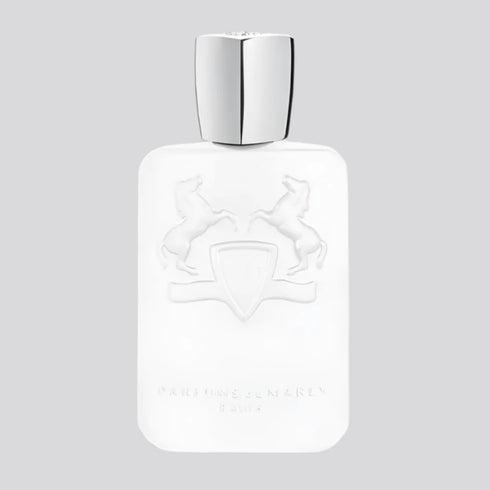- Home
- Parfums de Marly Galloway - Tester - HAUTE Parfums

Parfums de Marly Galloway - Tester - HAUTE Parfums
Galloway is the art of olfactory music. The shade and heat of pepper and citrus aromatics create surprise within this discerning perfume. The heart notes are an injection of sweet iris and heady orange blossom. At the base is a warm musk, honey-like amber and deep-wooded sandalwood, highly textured to curate a distinguished eau de parfum.
Best time to wear: For a bright summer of spring day
Our feedback: Parfums de Marly is one of our favorite perfume brands. This classic old brand is French luxury perfumery at is best - far superior to the chemical concoctions of modern perfumery.
- Parfums de Marly Galloway eau de parfum
- Top notes: Citrus, Pepper
Heart Notes: Iris, Orange Blossom
Base Notes: Musk, Amber, Sandalwood
- Original packaging is for reference only and is not included.
- 150 gram (weight)
- RRP £215.00 per 125ml
The lists of ingredients that make up the composition of parfums products are regularly updated. Commonly used ingredients are:
Alcohol ● Parfum (Fragrance) ● Aqua (Water) ● Alpha-isomethyl Ionone ● Benzyl Salicylate ● Limonene ● Linalool ● Ethylhexyl Methoxycinnamate ● Diethylamino Hydroxybenzoyl Hexyl Benzoate ● Citronellol ● Geraniol ● BHT ● Oil Extracts ● Citral ● Benzyl Alcohol ● Benzyl Benzoate ● Eugenol ● Coloring Agents ● Tocopherol ● DPG
The manufacturer is responsible for the ingredients of the product. We recommend checking the list of product ingredients directly on the manufacturer's website due to potential changes. Periodic updates to EU regulations could demand the for manufacturers to re-formulate existing fragrances to meet new regulations.
Be aware that large neck roller bottles may contain polymers to reduce leakage in according to regulatory packaging requirements. Roller bottles should not be transferred into spray bottles.
Allergies or Sensitivities:
If you suffer allergies or sensitivies, and before using a perfume product or the long-term use of fragrances, please check the latest updated list of ingredients from the original manufacturer to be certain that the ingredients are suitable for your personal use as they may differ, be updated or changed with new released batches.
Perfumes can also be used on clothes instead of skin to reduce direct skin contact. However, due to alcohol content or thickening agents, perfumes can have a small negative effect on fabrics:
The (EU) Cosmetics Regulation 1223/2009 lists the 26 most-known allergenic substances, which you can find in the link below:

